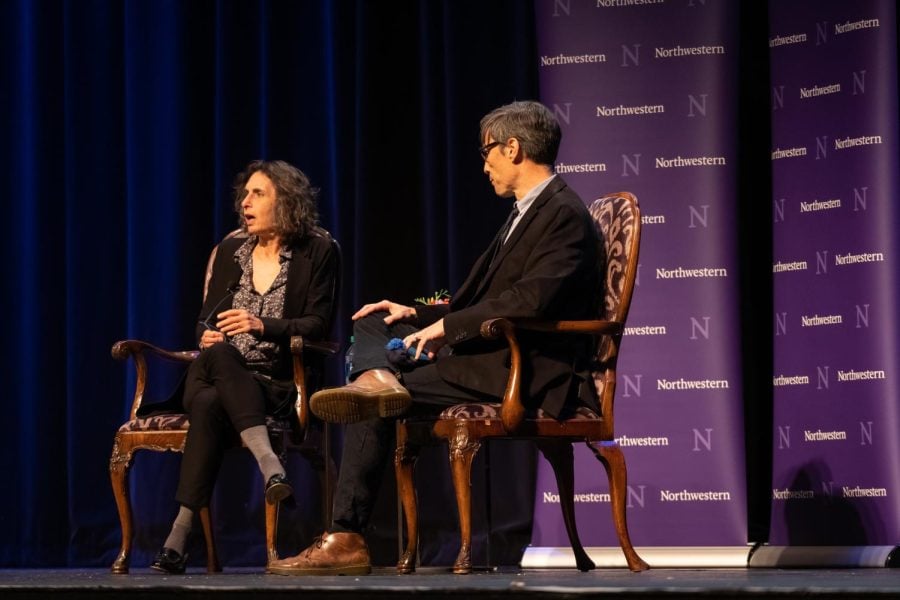Pulitzer-winning author Elizabeth Kolbert talks climate change at annual Leopold Lecture
Jonah Elkowitz/Daily Senior Staffer
Elizabeth Kolbert discussed climate change and possible solutions at the 33rd Annual Leopold Lecture.
October 12, 2022
Pulitzer Prize-winning author and environmentalist Elizabeth Kolbert delivered the 33rd Leopold Lecture on her book, “Under a White Sky: The Nature of the Future,” on Wednesday night.
The Leopold Lecture is an annual event that brings prominent scholars to NU to share ideas related to their work. Students started the series in 1990 to honor the life and scholarship of history Prof. Richard Leopold.
Weinberg Dean Adrian Randolph expressed his gratitude at seeing students gather in Cahn Auditorium to learn about environmentalism.
“There’s so much in Kolbert’s work for us to learn from,” Randolph said. “It’s so vitally important that not only older generations, but also students and younger generations, tackle some of the problems that Kolbert points to so incisively in her writings.”
A New Yorker staff reporter since 1999, Kolbert is both a journalist and a scholar. She said these dual roles inform her work deeply, especially in an era where climate change misinformation is still present in the media.
Kolbert’s lecture revolved around the struggle to strike a balance between humankind and the natural world.
“(Humans) are terrific problem-solvers,” Kolbert said in her lecture. “And one of the results of this is that we now dominate the planet, so much so that we now rival what used to be called ‘the great forces of nature.’”
In her talk, Kolbert discussed the modern problems facing the environment and highlighted various solutions. Coming on the heels of the recent Inflation Reduction Act, a major piece of U.S. climate legislation that President Joe Biden signed into law in August, Kolbert emphasized that there is much work yet to be done for the climate.
With more still to do, Kolbert said it’s easy to get discouraged tackling issues such as global warming and ecological degradation. In the face of these challenges, the answer is not blind optimism, she said, but instead a search for solutions.
“If there has ever been (a country with) a culture of optimism, of ‘our best days are still ahead,’ it’s the U.S. And if there’s ever been a country that’s emitted a lot of carbon dioxide, it’s the U.S.,” Kolbert said. “I don’t think our problem is a lack of optimism. I think our problem is a lack of action to justify that optimism.”
Gordon Scott (Weinberg ’89), an NU alum and Northfield, Illinois, resident, attended the event with his wife, Anne.
Scott shared Kolbert’s sentiment that discussing climate change can be disheartening, but it can also inspire change.
“I’m slightly less optimistic about the environment and climate change now than I was an hour ago,” Scott said after the lecture. “The positive to that is it can lead to more action on my part, but there needs to be more action on the part of eight billion of us on the planet.”
Kolbert told The Daily that staying engaged with the fight against climate change is the first step in working toward solutions. She explained that in her lectures and writing, she hopes to hold her audience’s attention enough to teach something new.
For Kolbert, it is an honor to join the list of scholars who have given the Leopold Lecture.
“I obviously don’t know what (Leopold) would have thought of the talk, but I do think that the problems that I am talking about are really going to define the course that history takes,” Kolbert told The Daily. “So I hope I fit into the tradition of the lectures, in tackling big issues and trying to shine some light onto them.”
Email: [email protected]
Related Stories:
— Environ-mentality: Lake levels rising along with environmental damage
— ‘Generations of Environmental Justice’ provides all-night climate education and builds community


